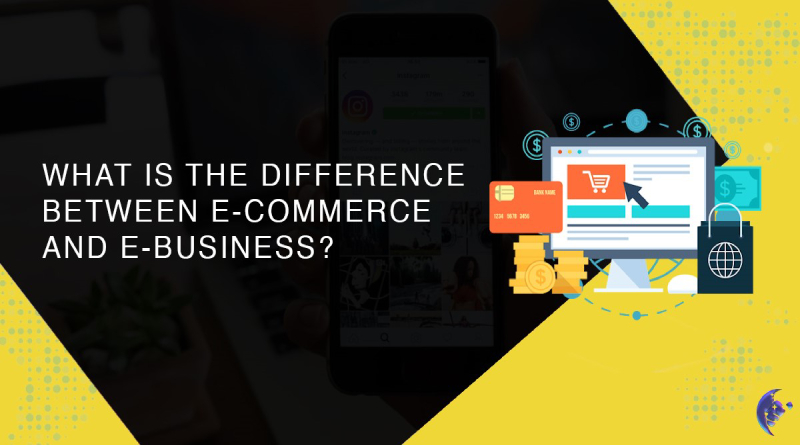We have all heard the word, E-commerce and E-business used extensively and interchangeably. With the emergence of Amazon, Flipkart, and other big names in the online shopping world, these types of businesses have become extremely prominent. With the internet and a smartphone, you can order anything you want without leaving the comfort of your home. However, contrary to widespread acceptance, there is a distinction between eCommerce and E-business, which we will be exploring in the article.
Table of Contents
ToggleWhat is E-commerce?
Electronic Commerce, popularly known as E-commerce, refers to the frequent buying and selling of goods and services online. It can be clothes, grocery items, books, electronics, and even food. The exchange of goods takes place with the help of websites and the internet and does not require the buyer, sellers, or any intermediary person to meet physically. E-commerce is mostly concerned with its customers, clients, and suppliers.
A few good examples of E-commerce are online hotel booking websites, online grocery stores, online fashion stores, and social networks.
There are many different types of E-commerce, depending upon who buys and who sells the goods or services.
1. Business to Business (B2B)
Any kind of electronic transaction between two businesses constitutes the B2B type of E-commerce.
For Example, Alibaba is a B2B E-commerce that connects manufacturers from China, Pakistan, the United States, and Thailand with the rest of the world.
2. Business to Consumer (B2C)
It is the most popular form of E-commerce that is has made a strong mark in our everyday life. From the food ordering app like Zomato to a house-hunting app like 99acres, this connects the final seller and the customers.
Its reputation owed to the fact that anyone can set up this business with a working website and stock of goods. If you’re preparing to set up an online store, you can look up the best digital marketing company in India and let them help to grow your business.
On the customer part, it is easier to shop with a few clicks rather than stepping out to a crowded market place with long waiting lines. Moreover, online shopping makes it easy to explore more options and compare prices very quickly.
3. Consumer to Consumer (C2C)
Another type of E-commerce is C2C, which makes use of electronic transaction of goods/services from one customer to another. It usually happens in an online market place like eBay, OLX, etc.
4. Consumer to Business (C2B)
Consumer to business is the type of E-commerce where a user or consumer provides a product or service to market to complete its goals or gain a competitive advantage.
For example, A freelancer writer offering his services to write the content of a company’s brochure.
5. Business to Administration (B2A)
Any exchange that takes place between a business and a government constitutes the B2A type of E-commerce. It involves a significant kind of services such as employment, social security, financial services, legal documents, etc.
6. Consumer to Administration (C2A)
Similar to the previous type of E-commerce, this takes place between a consumer and the government. For example, electronic tax filing, payment of health services, etc.
These were the different types of E-commerce business that takes place. Let’s now look at the definition of E-business and its brands, while understanding how it differs from E-commerce.
Also Read: How Ecommerce Can Help You Find Uncommon Truck Parts
What is E-business?
E-business, like E-commerce, eprocurement solutions makes use of the internet, extranet, web, and intranet to lead businesses. However, there are not limited to buying and selling of goods. It takes a broader view of the industry including electronic ordering processing, supply chain management, customer relationship management, etc. E-business is the umbrella under which E-commerce placed.
It includes various activities that performed to complete a business like conversing with employees, client, or business partners, solving issues, handling orders, etc. All of these done using electronic media.
Types of E-business
1. Pure Play
This type of E-business focuses only on one particular kind of product instead of a variety. It also exists solely online without owning any physical stores.
2. Brick and Click
This term applied to businesses that are available online, and they also have a physical store where customers can buy the same good and services offered on the internet.
Also Read: Tips To Make Your Business Financially Stable
The Advantages of E-Commerce & E-Business
The arrival of the internet has transformed many habits and working of the world and human beings. From social media to online discussion forums, we are all more connected and more aware. The field of online shopping has seen the most advancement with people crossing the shortcomings of trust, vendors, authenticity, and going all out.
Here are a few advantages that you can expect when doing the online business.
1. Crossing the physical boundaries
If you have a store in a city, you just have it in the city. But with an online business, you are not limited by the physical attributes of your business. You can cater your goods and services to people miles away, who can look up the products and pay for them online.
Your customers can also shop from their smartphones, giving them the charge of convenience and comfort.
2. Lower Cost
With having a physical store, there are many costs, like electricity, rent, telephone bill, etc.
Taking the business online, it helps to eliminate these costs that can increase the profit margin. Moreover, having an online store also saves on time, as everything can be done with a click of a button.
Also Read: 6 Tips for Building a useful Blog for your Small Business
3. Flexible Business Hours
Different from a physical store, your online store can operate in the middle of the night or the early morning without having anyone to sacrifice on their sleep. It leaps the boundaries of physical contact, adjusting with each customer’s comfortable time to shop.
4. Track your business
You don’t have to keep a physical record of every transaction, person, or cost when you have an online store. With facilities like Google Analytics, Google Trends, and website backend features, you can easily track your best sellers, your ROI, your most loyal customers, etc.
Now that we have understood E-commerce and its type & E-business and its type, I hope the distinction between the two is clear. For any other query, feel free to drop it in the comments below.
Related posts
Hot Topics
What is Kafka Used For: A Complete Guide
What is Kafka used for? If you’ve been diving into the world of distributed systems, microservices, or data streaming, you’ve…
How Do Password Managers Work? The Guide That Finally Makes Sense
Ever wonder how do password managers work and whether they’re actually safe? I get it. The idea of putting all…



